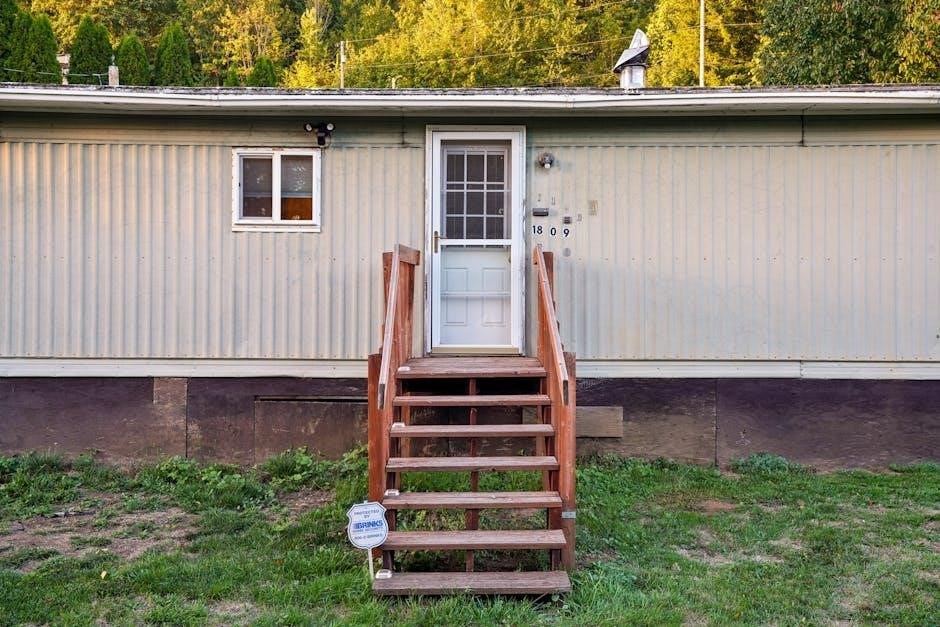mobile home rental agreement pdf

mobile home rental agreement pdf
A mobile home rental agreement is a legally binding contract between landlord and tenant‚ outlining terms like rent‚ duration‚ and property use. It ensures clarity and protection for both parties‚ preventing disputes. A well-drafted agreement is essential for a smooth tenancy experience.
Overview of Mobile Home Rental Agreements
A mobile home rental agreement is a written contract between a landlord and tenant‚ detailing the terms and conditions of renting a mobile home or space within a mobile home park. It outlines the rent amount‚ payment terms‚ lease duration‚ and permissible use of the property. The agreement also clarifies the responsibilities of both parties‚ such as maintenance‚ repairs‚ and compliance with park rules. Key aspects include rent increase policies‚ which often require advance notice‚ and lease renewal or termination terms. The agreement must comply with local and state laws‚ ensuring fairness and transparency. Having a formal document helps prevent disputes and provides legal protection for both parties. Tenants should carefully review the agreement before signing to understand their obligations and rights.
Importance of Having a Written Agreement
A written mobile home rental agreement is crucial for establishing a clear understanding between landlords and tenants. It provides legal protection for both parties by detailing the terms and conditions of the tenancy. Without a written agreement‚ disputes over rent‚ property use‚ and responsibilities can arise‚ leading to potential legal issues. A formal document ensures that both parties are aware of their obligations‚ such as rent payment terms‚ maintenance responsibilities‚ and lease duration. It also protects tenants from unfair practices and ensures landlords can enforce their rights. Having a written agreement fosters transparency and accountability‚ preventing misunderstandings and promoting a harmonious landlord-tenant relationship. Additionally‚ it serves as evidence in court if disputes arise‚ ensuring that both parties can rely on the agreed-upon terms.

Key Components of a Mobile Home Rental Agreement
A mobile home rental agreement outlines rent details‚ lease duration‚ property use‚ and tenant responsibilities‚ ensuring clarity and legal compliance for both parties.
Parties Involved in the Agreement
The mobile home rental agreement typically involves two primary parties: the landlord (or property owner) and the tenant. The landlord owns the mobile home or the lot where the home is situated‚ while the tenant is the individual or entity renting the property. In some cases‚ a property management company may act on behalf of the landlord to handle rental matters. Additionally‚ co-signers or guarantors may be included if the tenant requires financial backing. All parties must be legally recognized and have the capacity to enter into a binding contract. The agreement clearly identifies each party’s responsibilities and rights‚ ensuring clarity and preventing disputes. Proper identification of all parties involved is crucial for enforcing the terms of the agreement and maintaining a formal tenancy relationship. This section ensures accountability and legal compliance for both the landlord and tenant.

Rent and Payment Terms
Rent and payment terms are critical components of a mobile home rental agreement‚ outlining the financial obligations of the tenant; The agreement specifies the rent amount‚ payment methods‚ and due dates‚ ensuring clarity for both parties. Late payment penalties and grace periods are often included to enforce timely payments. Security deposits‚ if required‚ are also detailed‚ along with conditions for refunds or deductions. Rent increases must adhere to local laws‚ with proper notice periods for adjustments. Payment methods may include checks‚ electronic transfers‚ or online platforms‚ as agreed upon by both parties; This section ensures transparency and accountability‚ preventing misunderstandings related to financial responsibilities. Clear rent and payment terms are essential for maintaining a positive landlord-tenant relationship and ensuring seamless transactions throughout the tenancy. Proper documentation of these terms protects both parties and provides a legal framework for resolving payment disputes.
Duration of the Tenancy
The duration of the tenancy specifies the length of time the tenant is allowed to occupy the mobile home. This can be a fixed term‚ such as a six-month or one-year lease‚ or a month-to-month arrangement‚ which offers more flexibility. Fixed-term leases provide stability for both parties‚ while month-to-month agreements allow for easier termination. The agreement must outline the start and end dates of the tenancy‚ as well as the process for renewal or termination. Tenants typically need to provide written notice if they intend to vacate the property‚ with the notice period varying by jurisdiction. Some agreements may include automatic renewal clauses unless terminated by either party. The duration section ensures both landlord and tenant are clear on the timeframe of the rental arrangement and their obligations within it. This clarity helps prevent disputes and provides a structured timeline for the tenancy. Proper documentation of the tenancy duration is essential for enforcing the terms of the agreement.
Use of the Mobile Home and Property
The section on the use of the mobile home and property outlines the permitted purpose of the rental and any restrictions. It specifies that the mobile home is for residential use only and may limit the number of occupants. Tenants are typically required to comply with all applicable laws‚ zoning regulations‚ and rules of the mobile home park‚ if applicable. The agreement may also address whether the tenant is allowed to make modifications to the property or sublet the home. Use of the property for commercial purposes is usually prohibited unless explicitly agreed upon. This section ensures the property is used responsibly and helps maintain the overall condition of the mobile home and its surroundings for the duration of the tenancy. It also protects the landlord’s interests by setting clear guidelines for property use. Proper adherence to these terms is essential for a harmonious rental relationship.

Legal Requirements and Disclosures
Mobile home rental agreements must comply with local and state laws‚ including essential disclosures about property condition‚ rent increases‚ and tenant rights. Prohibited terms are strictly outlined to protect both parties.

Essential Disclosures for Mobile Home Rentals
Essential disclosures in mobile home rental agreements ensure transparency and legal compliance. Landlords must provide detailed information about the property’s condition‚ any known defects‚ and ongoing maintenance responsibilities. Disclosures often include specifics about utilities‚ parking‚ and shared facilities. Tenants must also be informed about their rights under local and state laws‚ such as protections against unfair evictions or rent increases. Additionally‚ landlords are required to disclose any environmental hazards‚ like lead paint or water quality issues. These disclosures are typically included in the rental agreement to avoid future disputes and ensure both parties are aware of their obligations and rights. Clear and accurate disclosures help build trust and prevent legal complications.
Prohibited Terms in Rental Agreements

Prohibited terms in rental agreements are clauses that violate local‚ state‚ or federal laws‚ rendering them unenforceable. These terms often attempt to waive tenant rights or impose unfair conditions. For example‚ clauses that penalize tenants for requesting repairs or forbid tenants from reporting violations are prohibited. Terms that allow landlords to seize personal property without legal process or impose excessive late fees may also be deemed unconscionable. Additionally‚ agreements that restrict tenants from assigning or subletting without reasonable cause can be problematic. Courts typically void such terms‚ ensuring tenants are protected under tenant-landlord laws. It’s crucial for tenants to review agreements carefully and seek legal advice if questionable terms are present. Landlords must ensure their rental agreements comply with legal standards to avoid disputes and potential penalties.

Process of Creating a Mobile Home Rental Agreement
Creating a mobile home rental agreement involves drafting a detailed document outlining terms‚ rent‚ duration‚ and property use. Involving legal professionals ensures compliance and clarity for both parties.
Steps to Draft a Rental Agreement
Drafting a rental agreement begins with identifying the parties involved‚ including the landlord and tenant. Clearly define the property details‚ rent amount‚ payment terms‚ and tenancy duration. Outline the responsibilities of both parties‚ such as maintenance and repairs. Include any specific rules or restrictions‚ like pet policies or guest stays. Ensure all legal disclosures are incorporated‚ such as lead paint notifications or mobile home park rules. Attachments like a property condition report or inventory may also be included. The agreement should be reviewed by a legal professional to ensure compliance with local laws. Finally‚ both parties should sign and date the document‚ with copies provided to all involved. This process ensures clarity and mutual understanding‚ protecting both landlord and tenant.
Reviewing and Signing the Agreement
Before signing a mobile home rental agreement‚ both parties must carefully review the document to ensure all terms are understood and agreed upon. The tenant should verify that the agreement reflects the agreed rent‚ payment terms‚ and duration of the tenancy. It is essential to check for any prohibited terms or unfair conditions. Landlords and tenants should ensure the agreement complies with local and state laws‚ including required disclosures. Once satisfied‚ both parties sign and date the agreement‚ creating a legally binding contract; Tenants should request a copy for their records. Signing the agreement confirms mutual acceptance of the terms and responsibilities outlined. If unsure‚ tenants may seek legal advice to protect their rights. A signed agreement ensures clarity and accountability for both parties throughout the tenancy. Always keep a copy for reference. The process ensures transparency and mutual understanding.
A mobile home rental agreement is a vital document that protects both tenants and landlords by outlining the terms of the tenancy. It ensures clarity on rent‚ payment terms‚ duration‚ and property use‚ while also addressing legal requirements and disclosures. By understanding the key components and adhering to local laws‚ both parties can avoid disputes and maintain a positive relationship. Tenants should carefully review the agreement before signing to ensure their rights are protected. Landlords must also ensure compliance with legal standards to avoid potential issues. A well-drafted and signed agreement fosters transparency‚ accountability‚ and mutual understanding‚ making it an essential step in the rental process. Always seek legal advice if unsure about any terms or conditions. A clear and fair agreement benefits everyone involved.